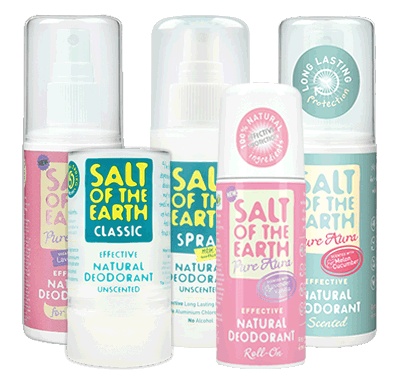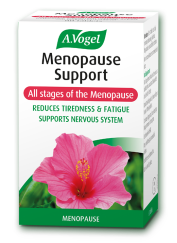Today's topic
Today on A.Vogel Talks Menopause, I'm going to be talking about four body odour changes that can happen during the menopause.
So, this is a really common question that I get asked by a lot of women, how and why is their body odour changing.
Why does body odour change during menopause?
There are lots of different reasons for this.

Are you Menopausal? Need help with your symptoms? Try our Menopause Symptom Checker.
Answer 3 question to find out if you could be menopausal and get personalised tips and advice straight to your inbox based on your results.
Sense of smell
One of them, just to start with, is that your own sense of smell can become much more acute. This is something that often happens during pregnancy. So, before you start getting really worried about how smelly you're getting, it could be just the fact that you are able to smell that little bit more than you could before.
This would include body odour, but also other smells. You might find that you become much more sensitive to the smell of paint, perfume, and pollution. So, if it's an all-over change that you're feeling all the time, then it's more than likely to be that your sense of smell has just become that little bit more acute.
The problem here is that, as your hormones start to change, in the peri-menopause and also during the menopause itself, that can have a number of different effects on the body
Temperature regulation
Another problem is that our temperature regulation goes haywire. And this is why you end up getting hot flushes and night sweats. So, because your body regulator isn't working properly, you're liable to sweat a lot more often than you would normally, before all the hormonal changes started to happen. And, the more you sweat, the more likely you are aware of the bacteria in the sweat causing odours, especially from under the arms.
Digestion
The other thing that can happen here is that our digestion can change. So, falling oestrogen can slow everything down and our elimination can become less efficient. What happens there is that, very often, the body will use sweat as a mechanism to get rid of extra toxins. These toxins then become food for the bacteria that are living on our skin. And these bacteria can then cause changes in body odour as well.
Dehydration
The other thing that can happen is dehydration. If you are really dehydrated, if you're not drinking enough water, then your sweat is going to become much more concentrated and that means the smell is going to be that little bit stronger, too. So, the number one rule here, if you notice any body odour changes, is to drink water. Remember to drink plenty of water every day and, sometimes, that can be enough to sort everything.
Body odour changes & what can help
There are four main areas in the body where the odour can change due to certain circumstances. So, why does this happen? We'll look at these four different areas now.
1. Under the arms
Under the arms is your primary place for sweating. So, this is where you're going to sweat the most, especially if you're starting to get the hot flushes or the night sweats.
The problem is, we tend to put lots of antiperspirants on to stop ourselves from sweating and smelling. And that can have a disastrous effect because it means that, if your body is trying desperately hard to regulate its own temperature, and you've blocked the primary area, your body is going to have to sweat from elsewhere. And, very often, this has a knock-on effect.
So, one of the really important things here is to try and avoid antiperspirants.
Now, I'm not expecting everybody to, you know, be smelly ever, ever afterwards. What you need to look at are natural deodorants. What they do is stop the bacteria, so you won't get the smell, but they will allow you to sweat as your body wants.
And, the more you can sweat properly from under the arms, the less likely you are to sweat from elsewhere in the body.
What can help?
So, look at natural deodorants. I use Salt of the Earth deodorants, and I find them great. They really do stop the smell but they allow me to sweat naturally.
|
2. Feet
Again, the feet, believe it or not, are one of the main areas where our body sweats from. So, if you have blocked your underarms off with antiperspirants, then you are more likely to end up with smelly and sweaty feet. The problem here is that we wear artificial materials in socks or tights and, very often, we have artificial material in our shoes.
So, our feet have no room to breathe properly and that's going to result in smelly feet.
What can help?
Again, here, there are foot deodorants that you can use. We have a lovely one from Salt of the Earth, too. It's just really cooling, especially if the weather's hot and your feet are getting really hot and sticky.
One of the best things you can do for sweaty feet is to take your shoes and your socks or tights off. I know it's not always possible to do this but, whenever you can, this is really good for your feet, and they will thank you for that little bit of fresh air.
3. The vagina
This is one area where a lot of women get quite upset and disturbed because the smell can really change and it can permeate your clothes.
So, with this one, you know, we don't want to be out in public if we feel that we are smelling a lot down in that area. The reason for this, normally, is quite simple. It's just the fact that, as oestrogen falls, it affects the mucus in the vagina, which has a direct effect on the level of friendly bacteria that live there.
If our balance of bacteria changes in the vagina, then the smell will change. There are a number of other reasons that the smell can change, and I have done a video blog on vaginal problems. So, if this is your particular area of worry, then do click on the link and I can go into a lot more detail on the things you can do to help yourself in that area.
What can help?
Simply, in this situation, a vaginal probiotic can really work wonders at helping to get everything back into balance. Remember things like cotton underwear, and avoid wearing really tight jeans, tight trousers, or tight tights, because these can affect the airflow in the area as well.
4. Bad breath
Again, there's a number of reasons for this. If our digestion is slowing down, then there can be a direct link between stomach function and bad breath. Our liver also gets stressed in the menopause as well, so that can be another factor.
There seems to be a link between poor liver function and bad breath. And, again, I've done a video on liver health, so have a little look at that one, too, if you want more information on how to look after your liver in the menopause. The other thing that can happen here is that your saliva can dry up. A dry mouth is a really common menopausal symptom and that can end up causing bad breath.
Our gums can change, too. So, our gums can become much more sensitive and bleeding gums is a really common problem. Our gums can recede as well. They can loosen away from the teeth, so you can end up getting deeper pockets round the teeth that can trap food and that will also contribute to your bad breath.
What can help?
So, the thing here would be, if you feel that you've got bad breath, definitely get things checked out by your dentist. They can check to see if there's any problem with your salivary glands because, if they're blocked, that will be an issue as well.
And look for really good toothpaste. I do tend to recommend natural ones in the menopause because our gums can become much more sensitive to a lot of the chemicals in normal toothpaste. And you can get a really great range of natural toothpastes that have wonderful things in them that will keep your gums really, really healthy.
So, I hope that this has given you a little bit of insight. It's one of these problems that we don't even really want to discuss with our best friends. But it can be a big worry, especially if we're out in public a lot so, hopefully, this has helped in some way. If any of you have tips for any of these areas, we would love to hear them.


 My top tip:
My top tip:


